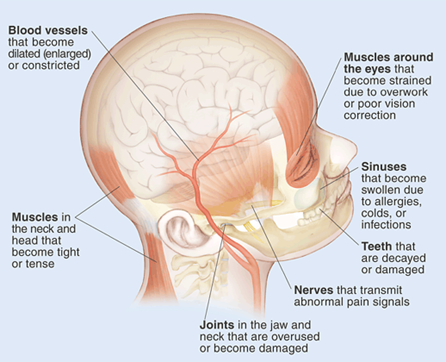How to Manage Headaches After a Head Injury
Symptoms after a head injury are hard to predict. Your headache does not tell how severe your head injury may be. You could have a mild head injury but still have very painful headaches. That’s why it’s important to learn how to manage your headaches.
Your headaches may be mild or severe. They may come and go, or you may have them all the time.
When you have a head injury, you may feel anxious, tired, or depressed. You may have trouble sleeping, slowed thinking, and memory loss. Headaches can make all these symptoms worse.
What causes your headache?
Your head aches because nerves, muscles and blood vessels are irritated. These irritated nerves send pain signals to the brain. Your brain then tells you where you hurt and how bad the pain is. Many factors can cause a headache.
|
They include:
- A previous head injury or concussion
- Neck pain
- Stress from your surroundings
- Muscle tension
- Feeling anxious, depressed, or tired
- Skipping meals
- Certain food and drinks
|
|
 |
Brain scans are needed only for certain symptoms. This is rare. CT scans have potential radiation effects and may show results that are not accurate.
What is referred pain?
Headache pain can be referred pain. This is pain that has its source in one place and is felt in another.
For example, pain behind the eyes may actually be caused by tense muscles in the neck and shoulders. This means that the place that hurts may not be the part of the body that needs treatment.
Is it a migraine?
Migraine is a severe headache. It causes throbbing pain, and sensitivity to light, noises, or smells. Most often it is on one side of the head, but may be on both sides. You may feel nauseated or you may vomit.
Some people see spots or flashes of light or have trouble speaking before or during their headache. Some have a certain feeling (aura) before or while they have a migraine.
There are many triggers for migraines such as foods or things in the environment.
The pain may last for 4 to 72 hours. Afterward, you may feel shaky for a day or so. If this is the first time you have these symptoms, you should get medical attention right away.
If you have a family history of migraines, a head injury or stressful symptoms of an injury may trigger a migraine attack.
Is this a tension headache?
A tension headache is most often a dull ache or feeling of pressure on both sides of your head. It may result from pain or tension in your neck and shoulders. Feeling depressed, anxious, or stressed can cause a tension headache.
Headaches may start with pain in the back of your neck and spread to your head. These headaches get worse as the day goes on.
They are more likely if your head injury includes a neck injury. This type of headache is often called a tension headache. It is the most common type of head injury headache.
How to manage head injury headaches
Strong pain medicines, such as opiates or narcotics, are not a good answer for head injury headaches. They can make other symptoms worse. They also can have unexpected side effects in a person with a head injury.
To reduce pain and tension, try these steps:
- Put a cold compress or ice pack on the site of the pain.
- Drink fluids. If nausea makes it hard to drink, try sucking on ice.
- Rest. Protect yourself from bright lights and loud noise.
- Calm your emotions. Imagine a peaceful scene.
- Massage tight muscles in your neck, shoulders, and head.
- To relax your muscles, soak in a hot bath or use a hot shower.
The best way to manage your headaches is with self-care. This is also called headache hygiene.
Here are some self-care tips:
- Take medicines only as your healthcare provider prescribes them. Don’t take any medicines on your own.
- If you feel a headache start, try to find a dark, quiet place where you can lie down.
- Wear dark glasses if bright lights seem to trigger your headache.
- Stay away from any foods and drinks that seem to trigger a headache.
- Learn to relax and prevent stress. Listen to music, meditate, or try deep breathing. If needed, work with a mental health expert to reduce stress and anxiety.
- Get daily exercise. This helps your body and brain.
- Go to bed and get up at the same time every day.
- Don’t use caffeine, alcohol, or tobacco.
- Take part in physical therapy to stretch and strengthen your muscles. Learn how to do these exercises at home.
- Think about trying other treatments like acupuncture or massage therapy.
- Keep a headache journal to show your healthcare provider. Write down every time you get a headache, how severe it is, and what seemed to trigger it.
Head injury headaches usually go away with time. How long it takes your brain to recover depends on the type of injury you had. Managing headache pain with self- care can help you heal faster.
When to call a healthcare provider
Call your healthcare provider if you have:
- A sudden, severe headache that is different form your usual headache pain
- A headache and a fever
- A sudden headache with a stiff neck
- Slurred speech
- Numbness or muscle weakness
- Loss of vision
- Pain after a head injury
- Convulsions or a change in mental awareness
- A headache you would call “the worse headache you’ve ever had”
Call your healthcare provider if you have a new headache and you are pregnant or if your child has headaches that keep coming back.
Image: StayWell Krames